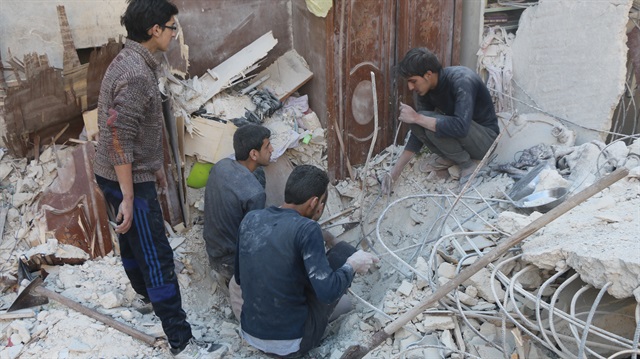

Syrian regime, armed opposition should ‘immediately and unconditionally’ allow aid into eastern Aleppo, rights group says
The Syrian regime and armed opposition groups should "immediately and without condition" allow humanitarian aid supplies into opposition-held eastern Aleppo, Human Rights Watch (HRW) said in a Monday statement.
Citing local activists and residents, the New York-based rights group warned that "the situation in the area is dire, with food and medicine growing scarce and extreme limitations on the ability to provide medical treatment".
The statement noted that no aid had reached besieged areas since July, despite calls from the UN Security Council demanding all parties to the conflict allow aid to reach those who need it.
HRW Deputy Middle East Director Lama Fakih underlined that opposition-held territory in the city was dwindling as residents face a "dire lack of food, water and medical supplies".
"There will be serious consequences if the parties don't immediately facilitate aid delivery as the laws of war require," Fakih warned.
An estimated 100,000 city residents remain under siege by the regime and its allies in some 8.6 square kilometers of eastern Aleppo.
Over the course of the last 27 days, some 990 civilians have been killed in eastern Aleppo in attacks by the Syrian regime and allied militias, local sources report.
The recent escalation comes amid attempts by the Russia-backed Assad regime to reestablish control over parts of Aleppo captured four years ago by armed opposition groups.
"The Russian-Syrian coalition's intense bombing of opposition-controlled parts of Aleppo is compounding the dire humanitarian situation," HRW said.
Eastern Aleppo residents told HRW that the area had limited access to medical services and that prices for electricity, water, and food were skyrocketing.
-'Massacres'
Bilal, a resident of besieged eastern Aleppo's Marja neighborhood, told HRW that the situation had become desperate.
"Massacres are happening and the world is watching. Everything is out of service now. The water has been cut and the hospitals are all bombed and all the bakeries too," he said.
"Food items are really expensive. Flour is about $20 a kilo, sugar $13 a kilo. Bread is being rationed at only five slices per family," Bilal lamented.
"There are no vegetables and no medicine; there is no fuel for cars. We are moving injured people using carts," he added.
Earlier this month, the New York-based rights group accused the Syrian regime and ally Russia of committing war crimes during a month-long aerial bombardment of eastern Aleppo.
It also said those who had ordered and carried out the assaults should be tried in an international war crimes tribunal.
Ahmad Said, a medic at a hospital that remains under heavy bombardment by Russian and Syrian warplanes, told HRW: "Today we cried over a patient who died in our hospital… The doctor couldn't do anything to help him. The entire hospital could not do anything."
"We have no oxygen canisters left. Supplies are running out. We have no intensive care unit," he said.
"People are eating from whatever is left, what they grow in their small home gardens. They now crush white beans and combine it with wheat to make bread," he added.
-'Lined with bodies'
Mohamed Abu Jafar, a forensic doctor at eastern Aleppo's health directorate, said the city was facing disaster.
He claimed the streets of the city were lined with bodies as transport systems had completely collapsed.
"There's no water in most neighborhoods; the pipes have been targeted by the military and destroyed. Transportation is almost nonexistent," he said.
"People can only walk. We have no vehicles left to transport the injured; some are being transported on vegetable carts," Abu Jafar added.
"We no longer have time to report and count casualties. Now there's 30, 40, 50 bodies a day and we're overwhelmed," he lamented.
Omar al-Arab, a photographer who lives in eastern Aleppo, told HRW that displaced people were everywhere in the city "and bodies are littered on the roads".
Al-Arab pointed out that only a few small clinics were operating in the area with extremely limited supplies.
-Accountable
The recent escalation comes amid attempts by the Russia-backed Assad regime to reestablish control over parts of Aleppo captured four years ago by armed opposition groups.
Jan Egeland, chairman of the UN/ISSG Task Force on Humanitarian Access in Syria, said continued violence in the city made humanitarian access almost impossible.
Despite Russian assertions last week that the Syrian regime would halt attacks on eastern Aleppo to allow civilians to leave besieged areas, Iran-affiliated Shia militias are hindering them from doing so, according to local sources.
"The governments of Syria and Russia are accountable for any and all atrocities that the victorious militias in Aleppo are now committing!" Egeland said in a tweet.
"Our renewed urgent appeal to Russia and Damascus: ceasefire today to let us evacuate wounded and other vulnerable groups from Aleppo's rubble," he said.
Syria has been locked in a devastating civil war since early 2011, when the Bashar al-Assad regime cracked down on pro-democracy protests -- which had erupted as part of the "Arab Spring" uprisings -- with unexpected ferocity.
Since then, hundreds of thousands of people have been killed and millions more displaced by the conflict.
#Aleppo
#Human Rights Watch
#humanitarian aid
#Syria


